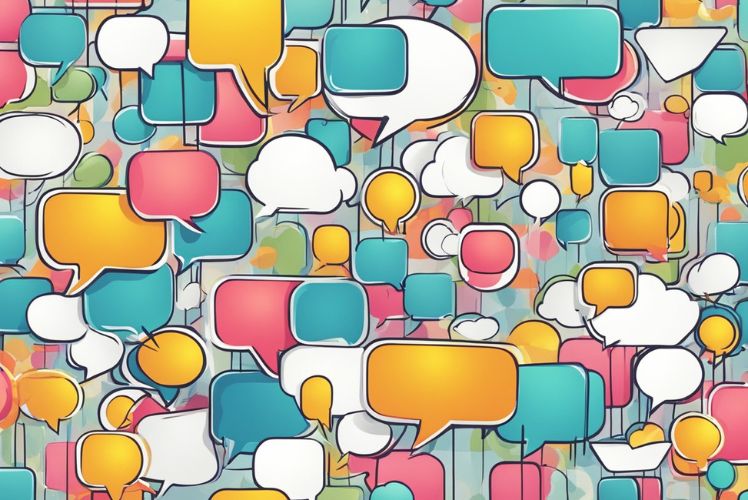Emotional intelligence plays a crucial role in enhancing our communication skills, ultimately paving the way for greater success in our personal and professional relationships. By developing our emotional intelligence, we can better understand ourselves and others, leading to improved interactions and stronger connections. This skill not only helps us express our thoughts clearly but also aids us in responding to others with empathy and respect.

When we practice emotional intelligence, we learn to recognise our own emotions and those of others. This awareness allows us to navigate difficult conversations with a greater sense of composure and clarity. As we cultivate these skills, we find that our relationships become more fruitful, fostering an environment where collaboration and understanding thrive.
In today's fast-paced world, effective communication is more vital than ever. By focusing on our emotional intelligence, we can unlock the potential for more meaningful conversations that drive success in all areas of our lives. Let us explore how we can harness this powerful tool to enhance our communication skills and strengthen our relationships.
Understanding Emotional Intelligence

Emotional intelligence (EI) is the ability to understand and manage our emotions and those of others. It plays a key role in communication by enhancing our interactions and relationships.
Components of Emotional Intelligence
Emotional intelligence consists of five main components:
-
Self-Awareness: This is our ability to recognise our emotions and understand how they affect our thoughts and behaviour. When we are self-aware, we are better equipped to communicate effectively.
-
Self-Regulation: This involves controlling our emotions and impulses. By practising self-regulation, we can respond calmly in stressful situations, improving our communication skills.
-
Motivation: This refers to our inner drive to achieve goals. High motivation helps us stay focused and committed, which can enhance our communication by making us more persistent and determined.
-
Empathy: This is the ability to understand the emotions of others. Empathy enables us to connect with people better and respond appropriately, fostering clear communication.
-
Social Skills: These are the skills we use to interact with others. Strong social skills help us build relationships, resolve conflicts, and communicate more effectively.
Emotional Intelligence vs Cognitive Abilities
Emotional intelligence differs significantly from cognitive abilities, like IQ. While cognitive abilities measure our reasoning and problem-solving skills, EI focuses on our emotional skills.
-
Emotional Quotient (EQ) is often used to refer to emotional intelligence. It highlights our capacity for emotional awareness and management, which is essential for effective communication.
-
Cognitive Skills involve logic and knowledge but do not necessarily improve our interactions or relationships.
In essence, EI complements cognitive abilities. A person can have high IQ but low EQ, which may hinder their communication success. Understanding this difference allows us to appreciate the importance of emotional intelligence in all aspects of our personal and professional lives.
The Role of EI in Enhancing Communication

Emotional Intelligence (EI) plays a crucial role in improving our communication skills. By harnessing the different facets of EI, we can effectively convey our thoughts and feelings while understanding those of others. This enriches our interactions and strengthens relationships.
Facets of Effective Communication
Effective communication goes beyond just words. It involves being aware of our emotions and those of others. EI helps us gauge how our tone and facial expressions affect our messages. We learn to adjust our communication style based on the emotional cues we observe.
For instance, if we notice someone appears upset, we can alter our approach to be more supportive. This responsiveness is a key aspect of EI. By recognising non-verbal signals, we improve the clarity of our interactions.
Furthermore, using EI enables us to express our thoughts more clearly. We can articulate our feelings without letting them overwhelm our message. This balance promotes a more engaged and understanding dialogue.
Empathy and Active Listening
Empathy is at the heart of effective communication. It allows us to connect with others on a deeper emotional level. When we practice empathy, we can understand different perspectives. This builds trust and encourages open conversations.
Active listening is a vital skill linked to empathy. It requires our full attention, ensuring we truly hear what others are saying. We can confirm our understanding by summarising their points or asking clarifying questions.
Through active listening, we show respect and validation. This creates a safe space for sharing thoughts and emotions. By combining empathy and active listening, we foster better collaboration and strengthen our connections, enhancing both personal and professional relationships.
EI in the Workplace

Emotional intelligence (EI) plays a critical role in shaping our work environment. It enhances how we communicate, improves leadership, and promotes teamwork. By understanding and managing emotions, we can create a more positive workplace.
Leadership and Emotional Intelligence
Effective leaders use emotional intelligence to inspire their teams. They recognise their emotions and understand how these feelings affect others. This awareness builds trust and fosters commitment among team members. Leaders with high EI adapt their communication style, making it easier for others to relate. They motivate employees by recognising their contributions, which boosts job satisfaction and encourages collaboration toward organisational goals.
Conflict Management and Resolution
Emotional intelligence is vital for managing conflict in the workplace. When disagreements arise, those with strong EI can remain calm and composed. They listen actively to all parties involved, ensuring everyone feels heard and valued. This approach facilitates open dialogue and encourages constructive solutions. By addressing conflicts effectively, we maintain positive interpersonal relationships and reduce tension. This improves overall team dynamics and helps us focus on our tasks with greater motivation.
Fostering a Supportive Work Environment
A supportive work environment thrives on emotional intelligence. We can promote a culture where employees feel safe expressing their thoughts and feelings. Open communication builds trust among colleagues. Team members are more likely to collaborate and share ideas. Leaders can facilitate this by encouraging feedback and recognising team achievements. When we nurture these relationships, we enhance job satisfaction and increase commitment to our work and organisational objectives.
Developing Communication Skills Through EI

Emotional intelligence plays a significant role in enhancing our communication skills. By focusing on key areas like interpersonal skills and rapport-building, we can better connect with others and improve our interactions.
Enhancing Interpersonal Skills
To improve interpersonal skills, we need to develop our emotional awareness. Recognising our own emotions helps us understand how they influence our behaviour. This self-awareness allows us to respond thoughtfully rather than react impulsively.
We can practise active listening, which involves paying full attention to the speaker. This shows that we value their perspective. Additionally, we should respond with empathy, validating others' feelings to foster trust.
Improving our social skills involves being adaptable. We can adjust our communication style based on the situation and the people involved. This initiative helps create a more comfortable environment for open dialogue.
Building Rapport and Cooperation
Building rapport starts with recognising and understanding others' emotions. By reflecting on their feelings, we can forge stronger connections. This understanding is vital for teamwork and collaboration.
We should strive to communicate clearly and openly. Being honest in our interactions fosters trust and encourages cooperation.
Utilising positive body language, like eye contact and smiling, conveys warmth and friendliness. These non-verbal cues enhance our connections.
Practising patience helps us navigate conflicts calmly. When we approach challenges with a level head, we are more likely to find mutually beneficial solutions. By focusing on these strategies, we can create a cooperative atmosphere and strengthen our communication skills through emotional intelligence.
Measuring and Improving Emotional Intelligence
Understanding how to measure and improve emotional intelligence (EI) is essential for our growth in communication skills. Using the right tools and strategies can help us enhance our emotional quotient (EQ) and develop better relationships in both personal and professional settings.
Tools for Assessing EI
We can start measuring our emotional intelligence through various tools. One popular method is self-assessment questionnaires, which allow us to gauge our understanding of our emotions and reactions.
Here are some tools to consider:
- EQ-i 2.0: This is a comprehensive assessment measure that evaluates different components of emotional intelligence, such as self-perception, self-expression, and interpersonal skills.
- Six Seconds Emotional Intelligence Assessment (SEI): This tool offers insights into our emotional strengths and weaknesses, aiding in leadership development.
- Personality tests: Assessments like the Big Five can be helpful to understand how our personality traits relate to our emotional intelligence.
Using these tools regularly can provide valuable feedback and help us track our progress over time.
Strategies for EI Development
Improving our emotional intelligence requires intentional strategies. First, we should start practising self-awareness by reflecting on our feelings and their origins. Keeping a journal can also help us identify patterns in our emotional responses.
Here are effective strategies to enhance EI:
- Mindfulness exercises: Practicing mindfulness helps us manage stress and boosts optimism, which is connected to higher emotional intelligence.
- Active listening: Engaging fully when others speak can improve our empathy levels, a key component of EI.
- Feedback: Seeking constructive feedback from peers can help us recognise areas needing improvement and encourage professional growth.
Implementing these strategies can positively impact our relationships and enhance our overall effectiveness in communication.
The Impact of Emotional Intelligence on Personal Development
Emotional Intelligence (EQ) plays a crucial role in shaping our personal growth. By enhancing our self-awareness and influence, we can foster better relationships and achieve greater success. We also cultivate essential skills through self-reflection and self-motivation.
The Correlation Between EQ and Personal Success
A high emotional quotient helps us recognise and manage our emotions. This skill is vital in navigating personal and professional environments. When we are aware of our feelings, we can respond more effectively to challenges.
In personal development, individuals with strong EQ can build lasting relationships. They communicate better, resolve conflicts, and collaborate effectively. Their ability to understand others enhances their influence and allows for positive interactions.
Research shows that those with higher emotional intelligence often achieve greater success in their careers. They adapt to feedback, set realistic goals, and are motivated to learn continuously. This commitment to growth can lead to promotions and career advancements.
Commitment to Continuous Learning
Continuous learning is key to personal development. By prioritising self-reflection, we can identify areas for growth and improvement. This process encourages us to adapt our emotional skills in everyday situations.
We should actively seek experiences that challenge our emotional intelligence. This could include engaging in workshops or seeking feedback from peers. Each opportunity enhances our understanding and pushes us to refine our personal skills.
Moreover, developing self-motivation is essential. When we are committed to learning, we become resilient. We push through setbacks and remain focused on our goals. This persistence leads to a stronger emotional foundation, enabling us to face future challenges with confidence.





















